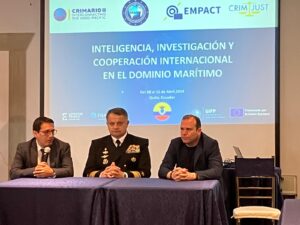
15/04/2024
Members of the Ecuadorian Navy, Police, Customs and Public Prosecutor's Office have received comprehensive intelligence training that covers all stages of crime followed by criminal organisations.
Intelligence training has been carried out in Quito, with the aim of establishing a link between law enforcement and control between different state agencies. The maritime sector is key to curbing drug trafficking and criminal activity as illicit activity is carried out using all types of vessels.

Drug trafficking in Ecuador has a negative impact on all links in the commercial logistics chain, including the maritime sector. The training has been provided by international experts in intelligence, investigation and international cooperation, who have covered the entire iter criminis used by criminal organisations. In addition, due to the great economic power used to penetrate local institutions, a module on ethics and integrity was also carried out.
International cooperation between institutions has become essential in the fight against drug trafficking in Ecuador, where in addition to local groups, European organisations control illicit activity in coordination with Mexican and Colombian cartels, causing a serious security situation for the country.
The training has been led by SEACOP, a project funded by the EU, with the participation of the European projects CRIMJUST, which has allowed the participation of several Ecuadorian prosecutors in the training and has addressed the issue of ethics and the fight against corruption, and CRIMARIO, which has presented the IORIS platform for sharing sensitive information at the international level in the fight against maritime trafficking.
Ecuador is currently used as a platform for cocaine hydrochloride -CHC- produced mainly in Colombia, and requires comprehensive support, especially considering that CHC production is on the rise. For this reason, Ecuador is one of the priority countries for the SEACOP Project, which has already carried out numerous training and operational activities with the aim of supporting the work of the country’s different institutions in the fight against illicit maritime trafficking.
In a previous stage of the SEACOP project, a notable coordination deficit was identified at the national level in the fight against organised crime. Although Ecuador has the capacity to gather intelligence, it has been through cooperation that specific areas have been identified for improvement in international coordination, which is crucial to develop a unified strategy in the face of this global challenge.


